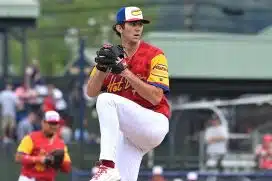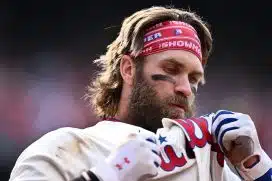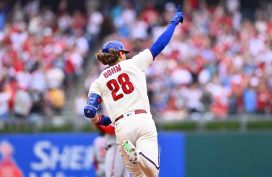By Tim Kelly, Sports Talk Philly editor
While former Philadelphia Phillies Billy Wagner and Curt Schilling wait out their Hall of Fame cases — both of which are complicated, but for different reasons — the Phillies are set to have a slew of former players appear on the ballot in the next three seasons.
It's not clear when or who the next person to be elected to the Hall of Fame as a Phillie will be, but the organization has numerous former players with legitimate chances to be elected into the Hall of Fame over the next few cycles.
2018
Brad Lidge: "Lights out" only pitched in the big leagues for parts of 11 seasons, meaning he barley was in the bigs long enough to be on the ballot. Obviously, his 2008 season that saw him go 49 for 49 in saves — including saving the game-clinching games of the NLDS, NLCS and World Series — will forever live on in the hearts of Phillies fans. His Hall of Fame candidacy is likely to die in it's first year, however.
Lidge, based off of 2008 alone, may end up eventually getting on the Phillies' Wall of fame, though they are yet to put him on the ballot even though he's met the eligibility requirements the past two years.
Trending: While premise of Ken Giles trade was strong, Phillies' return not faring well enough
Kevin Millwood: Millwood was acquired for Johnny Estrada after winning 18 games in 2002 for the pitching-loaded Atlanta Braves. Both him and fellow 2003 first-time Phillie David Bell disappointed in their short tenures in Philadelphia.
In two seasons with the Phillies, Millwood posted a combined 4.43 ERA, failing to give the Phillies the ace they had lacked since dealing Curt Schilling in 2000.
His Hall of Fame candidacy is pretty weak, considering he fell well short of 200 wins and has a career ERA of 4.11 and a FIP of 3.99.
Jamie Moyer: Moyer's greatest attribute for the Hall of Fame is that he actually has significantly more wins (269) than 2015 inductee Pedro Martinez (219) and former Phillie Curt Schilling (216). The problem with that line of thinking is wins have correctly been devalued as a statistic and he also has over 100 more losses (209) than Martinez (100) and 63 more than Schilling (146).
Moyer had a storybook, 25-year career, and should be proud of that. However, a career ERA of 4.25, mixed with a FIP of 4.47 and an xFIP of 4.65, aren't even worth serious consideration.
Scott Rolen: I've heard numerous people with Hall of Fame votes suggest that Rolen isn't someone who voters are going to discount. In terms of advanced metrics alone, he actually has the highest career WAR of anyone on this list (70.1), including the future Hall of Famer discussed next.
WAR aside, Rolen had 10 seasons where he hit 20 or more homeruns, five where he had over 100 runs batted in, was a seven-time All-Star and won eight gold gloves.
He's certainly not a fan favorite in Philadelphia, and clashed with someone (or multiple people) in nearly every stop he had during his career, but he deserves a fairly hard look for the Hall. In all likelihood, he will have to build a grassroots case and hope to get elected at the back-half of his eligibility.
Must Read: Common sense is gone with Hall of Fame voting
Jim Thome: Thome represents the next chance for a former Phillie to be elected to the Hall of Fame. In my mind, over 600 homeruns, 2,300 hits and a career WAR accumulation of 68.9 (per Frangraphs) should make Thome a first-ballot Hall of Famer.
Thome is just one of eight members of the 600 home-run club in baseball history, and one of only five that hasn't been connected to performance-enhancing drugs. That alone should make him a first ballot hall of famer, but it's hard to tell how voters will react once he is on the ballot.
When he does eventually get in, he'll do so as a member of the Cleveland Indians, not the Phillies.
2019
Roy Halladay: Halladay's hall of fame case isn't as cut and dry as it once seemed it would be. On one hand, he's won Cy Young awards in both leagues, led the league in wins twice, threw a perfect game and is one of two players to ever throw a no-hitter in the playoffs.
On the other hand, while he was an eight-time All-Star and had a pretty sustained peak, his overall career was short. That means that while he pitched in parts of 16 big-league seasons, his career WAR of 65.2 and his JAWS of 57.6 both fall short of those accumulated by Mike Mussina and Curt Schilling, both of whom are yet to be elected to the Hall of Fame.
One thing that Halladay has going for him is that it's hard to think of a pitcher on this side of 2000 that was definitely better than him. Clayton Kershaw's career numbers are on track to trounce his, but he's going to be a Hall of Famer and he's only one person in 15 years. Halladay's numbers are better than contemporaries like Johan Santana and CC Sabathia.
Related: Halladay says he would go into Hall of Fame with Blue Jays, not Phillies
Roy Oswalt: Oswalt was one of the better pitchers during the first decade of this millennium, racking up over 52 career WAR. It actually hurts his candidacy in a sense that he was part of rotations that housed Roger Clemens and Andy Pettite (Houston) and then eventually Halladay, Cole Hamels and Cliff Lee. That, at least to some degree, overshadowed how good of a career he had.
Between 2002 and 2007, Oswalt won 98 games and accumulated 32.5 WAR, while helping the Astros go to the playoffs four times, including in 2005 when they won the National League pennant.
Oswalt's career in Philadelphia only lasted for parts of two seasons, but he was a member of both H20 and R2C2, and scarily enough there are kids who watch the Phillies now who don't know what either of those mean.
Either way, he falls into the category of not having a long enough period of sustained success to get in. It should be interesting to see how long, if at all, he stays on the ballot.
Juan Pierre: The former MLB Memes darling had the best days of his 14-year career with the division rival Miami Marlins, swiping 167 bags between 2003 and 2005, and helping the Marlins to their second World Series title in 2003.
Pierre's Phillies career was short-lived, as he batted .307 and stole 37 bases for the Phillies during the disappointing 2012 season, before returning to the Fish to finish out his career a year later.
He'll be off the ballot in his first year of eligibility.
Interview: Former Phillie Wagner happy for Bagwell, hopes to get call to Hall himself
Michael Young: Young spent the first half of the final season of his 13-year career with the Phillies, but that season wasn't exactly the best representation of the career he had.
Young was a seven-time All-Star, won the 2005 batting title and accumulated 2,375 hits, which is pretty impressive considering he only played 13 years.
Two things will work against the long-time Ranger when he reaches the ballot — the aforementioned short career and the fact that with the exception of 2006 and 2008, he wasn't a very good fielder.
2020
Abreu was the first jersey I owned as a child, though I later grew to understand why my parents covered my ears every time they had something to say about Abreu.
Regardless of how Abreu's laid-back personality was viewed in Philadelphia, he had pretty tremendous longevity and accumulated just shy of 2,500 hits in his career. WAR is far from the only stat that should be used when evaluating players, but his career WAR is higher than every player on this list not named Halladay, Thome or Rolen. He's not going to be a Hall of Famer, but he would seem to fall into the category of players who don't deserve to fall off the ballot quickly either.
And yes, for those of you scoring at home, he absolutely should be elected to the Phillies Wall of Fame.
Phillies News: Curt Schilling says he doesn't believe he's a Hall of Famer
Cliff Lee: If there was a Hall of Fame for how dominant someone was at their peak, Lee would be waltzing into it along with Tim Lincecum and Grady Sizemore.
Between 2008 and 2013, Lee accumulated a 37.3 WAR, won the American League Cy Young and pitched over 200 innings each season.
Lee was something of a mercenary even at his peak, spending time with the Cleveland Indians, the Phillies, the Seattle Mariners, the Texas Rangers and eventually the Phillies again. He only pitched in the playoffs three times over that period, but he helped the Phillies to win the National League pennant in 2009 and the Rangers in 2010. Overall, Lee was one of the more dominant pitchers that the postseason has ever seen, going 7-3 with a 2.52 ERA, a 0.93 WHIP and three complete games in 11 playoff starts.
Unfortunately for Lee, he really only had five seasons outside his six seasons of dominance, meaning that his counting numbers fall far short of what it takes to be a Hall of Famer.
—-
The one thing that's worth pointing out about the former Phillies on this list is that the two who seem like pretty sure bets to eventually be voted in — Halladay and Thome — won't be going into the Hall as Phillies. Even Curt Schilling, should he eventually join the two in Cooperstown, may be given a Diamondback or Red Sox hat.
That means that the Phillies may be stuck waiting on Jimmy Rollins, Chase Utley or Cole Hamels, none of whom are locks for the Hall of Fame, for a chance that someone goes in as a Phillie.







